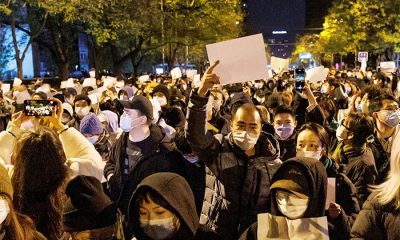Midweek Review
Cracks in the Fortress

By Lynn Ockersz
Defiant hearts throng the streets,
Tugging tirelessly at their chains,
Taking on the Iron Fist face-to-face,
Which cannot afford to relent,
Since for it too much is at stake,
And the world may not call this,
Iran and China’s Bastille moment yet,
Since the fire power of the state,
Remains formidable and lethal,
But chinks emerge in the armour,
Of those holding the reins,
And this could spell epochal change.
Midweek Review
North: Focus on security, concerns over Vadamarachchi camp pullout
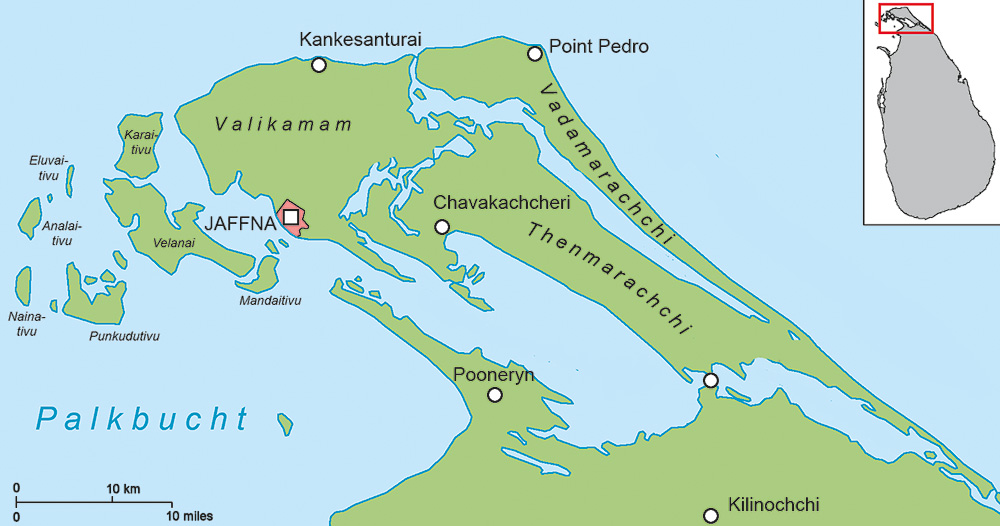
Political compulsions cannot override military requirements. A sensible government won’t give in to unfair demands, regardless of consequences. The Yahapalana government betrayed the war-winning armed forces when it co-sponsored a US-led accountability resolution in early Oct. 2015. Over the years, governments blundered when dealing with those spearheading the separatist project. President Ranasinghe Premadasa foolishly vacated strategically important camps during the 1989-1990 period thinking that it would help to win over the Tigers. The vacated camps included Point Pedro and Valvettiturai. Premadasa granted presidential pardon for convicted LTTE terrorists. Also in line with his overall flawed strategy, Premadasa facilitated the setting up of the political wing of the LTTE and funded the group to the time of Rs 125 mn during 1989-1990 period. Some of the funding was made available after the LTTE resumed hostilities in June 1990, following 14-month long honeymoon with the UNP leader.
Finally, he himself paid the supreme price for such follies when a Tiger suicide bomber, who had infiltrated his inner circle, carried out one of the most daring suicide attacks during the May Day celebrations of 1993 in Colombo.
By Shamindra Ferdinando
SLPP National List MP Namal Rajapaksa, on Nov. 20, expressed serious concerns over the planned vacation of an Army camp in the Jaffna peninsula. War-winning President Mahinda Rajapaksa’s eldest son and former Minister tweeted: “According to reports, an Army camp in the North has been withdrawn, for land to be released back to civilians, and many more such camps are to be withdrawn in the coming months. While the release of lands is not an issue, if it is done in consultation with the security forces, it should not be done at the cost of compromising national security. SL fought 30 years to defeat terrorism and today all communities enjoy freedom at the cost of thousands of lost lives. It is of utmost importance that national security is maintained, whether it is in the North or South.”
Contrary to his declaration, the strategically located detachment, a company headquarters of a Sinha Regiment battalion, hadn’t been vacated yet. A highly placed defence official told the writer, last weekend, that the military negotiated with landowners regarding the handing over of the camp. Negotiations that had been initiated during the tail end of Ranil Wickremesinghe’s presidency were finalized and the pullout would be completed in two weeks, the official said. Karkovalam is situated south of Point Pedro light house area.
Lawmaker Rajapaksa alluded the proposed removal of the camp to an understanding between President Anura Kumara Dissanayake’s National People’s Power (NPP) government and the Northern community, plus the Tamil Diaspora that enabled his party to secure all electoral districts in the Northern and Eastern provinces, except Batticaloa. Both lawmaker Rajapaksa and the defence official were referring to troops based at Karkovalam, near the coast of Manalkadu in Vadamaratchchy (north). The Navy maintains a base at Point Pedro, north of Karkovalam. The emphasis should also be on neutralizing smuggling operations across the Palk Straits.
Jaffna peninsula consists of three sectors, namely Waligamam, Thennamaratchchy and Vadamarachchi.
In a story headlined ‘Sri Lankan army camp in Jaffna ordered to disband after decades of occupation’, posted on Nov, 20, The Tamil Guardian declared the vacated three acres of land would be returned to its rightful owners. The Tamil Guardian claimed that: “It is the first move to dismantle the intense militarization of the Tamil homeland in years.”
Obviously, there hadn’t been any order in respect of the Karkovalam pullout. The whole exercise had been conducted in an orderly manner, through negotiations between the military and the landowners.
The SLPPer’s tweet, pertaining to Karkovalam pullout, should be examined taking into account the criticism directed at the NPP government over the opening of the Palali-Achchuveli main road that remained closed for over 15 years, after the successful conclusion of the war. Newly elected President Anura Kumara Dissanayake, who is also the Commander-in-Chief of the armed forces, in his capacity as the Defence Minister ordered the Palai-Achchuveli main road opened two weeks before the general election held on Nov. 14.
One cannot find fault with MP Rajapaksa for taking up the issue against the backdrop of the humiliating defeat suffered at the recently concluded general election. The only Rajapaksa in Parliament after the political tsunami brought the SLPP down to just three MPs (two elected and one appointed), the former Hambantota District lawmaker had no option but grab any opportunity to hog the limelight. Despite the humiliating performance at the two recent national polls, the SLPP won handsomely at the two preceding Presidential and General elections. Unfortunately, the SLPP took the massive mandates received on those occasions for granted.
The issue at hand is whether the NPP would pursue an agenda inimical to national security, as alleged by the SLPP and other interested parties. Did the opening of the Palali-Achchuveli main road, and the vacation of Karkovalam, undermined the overall security in the Jaffna peninsula?
The new government has been accused of bending backwards to appease the Northern community and the Tamil Diaspora. Interested parties took advantage of a congratulatory message issued by the influential Canadian Tamil Congress (CTC) on the NPP’s victory at the general election. The CTC dealt with six specific issues, including two that pertained to the deployment of the armed forces, and the security sector. Let me reproduce them verbatim:
(a) Restoration of Land Rights: The CTC called for the return of privately-owned lands in the Northern and Eastern provinces that are currently occupied by the military, as well as a cessation of illegal land acquisitions, to rebuild trust and restore rightful ownership.
(b) Reform of the Security Sector: The letter emphasized the need to align the military presence in the Northern and Eastern provinces with the rest of the country and to discontinue military involvement in commercial ventures, such as farming and hospitality, which hinder local businesses and farmers.
The presidential and general elections delivered a knockout blow to the Diaspora groups. The CTC is no exception. Actually, the CTC’s call to reduce the military presence in the Northern and Eastern areas is irrelevant. Such declarations are only meant to deceive the gullible public and appease those who cannot bear the LTTE’s defeat.
The war-winning Mahinda Rajapaksa government authorized the releasing of both state and privately-owned land in the Jaffna peninsula during Lt. Gen. Jagath Jayasuriya’s tenure as the Commander of the Army (15 July 2009 – 31 July 2013).
Gradual releasing of land continued throughout the post-conflict period as successive governments thinned military presence in the Northern and Eastern regions. Therefore, the opening of the Palali-Achchuveli main road, and vacation of Karkovalam, shouldn’t be a cause for unnecessary concern but considered in line with the government overall security posture.
Perhaps, the best way to promote post-war national reconciliation is countering unsubstantiated war crimes allegations that were utilized by the US to move an accountability resolution, targeting Sri Lanka, in early Oct. 2015. The treacherous Yahapalana government co-sponsored that resolution, thereby betraying the war-winning military and the political leadership. Whatever the shortcomings on the part of the Rajapaksas and those aligned with them, they cannot be deprived of the nation’s gratitude for sustaining the war effort in the face of daunting challenges, both domestic and external.
Pre-2005 Jaffna
Those who complain of saturation of the Northern and Eastern regions with military and police conveniently forget whichever political party that had been in power was compelled to face the LTTE’s conventional military challenge, as well as meticulously planned operations, conducted in areas under government control, in order to sow chaos.
At the time Eelam War IV erupted in the second week of August 2006, the largest deployment of troops was in the Jaffna peninsula, that was brought under government control during the 1995-1996 period. Karkovalam area had been captured during that period.
In 2006, the LTTE had approximately 15,000 square kms under its control in the Northern and Eastern regions and the group posed quite a significant threat to the government. Their main concentration of troops and firepower had been aimed at preventing the Army from trying to push southwards across the Muhamalai defence line. Jaffna military bases had been within the range of the LTTE’s long range artillery. The group had considerable firepower that overwhelmed the Army on many occasions, particularly those battalions deployed along Kilali-Muhamalai-Nagarkovil frontline before they were brought down to their knees during the Aug. 2006-May 2009 all-out campaign to defeat the might of the separatist LTTE.
The LTTE almost succeeded in overwhelming Jaffna during the 2000-2001 period but the military managed to stabilize the peninsula before Eelam war IV erupted in August. There had been four Divisions, plus troops, deployed in the peninsula, and two of them, 53 and 55 Divisions, joined large scale operations on the Vanni east front in late 2008. The combined armed forces brought the war to a successful conclusion in May 2009 against the assertions of pundits here and abroad.
Having eradicated the LTTE within three years, the winding down of security forces deployment began in the absence of an LTTE threat. Although some foreign governments and sections of media asserted that the LTTE could resume hit and run attacks and engagements were likely to continue for years, such a situation didn’t materialize. That was primarily due to over 12,000 cadres, both hardcore and child soldiers, surrendering to the advancing Army. The LTTE simply lacked the will, or the wherewithal, to engage the Army in hit and run attacks.
Had the LTTE retained at least a minor post-war ‘operational’ capacity, the gradual reduction of troops from the North and East could never have taken place. The Tamil community and the Tamil Diaspora should appreciate the total destruction of the LTTE that enabled the gradual disassembling of what can be described as ‘security structure’ in place in the North with the ending of the needless bloodshed.
Regardless of the restoration of civil administration, the government cannot, under any circumstances, lower its guard. The deployment of armed forces must be the exclusive prerogative of the government of the day.
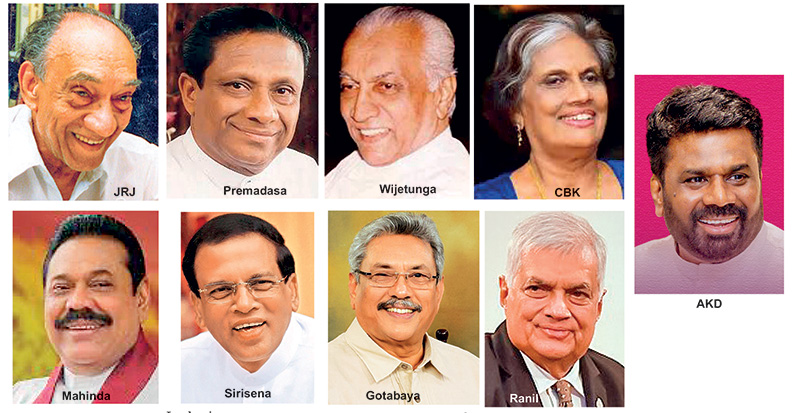
Gradual decrease in strength
Rapid recruitment during Eelam War IV resulted in almost doubling of the Army’s strength. By the time the combined security forces eradicated the LTTE menace in May 2009, the regular and volunteer strength of the Army alone had been 205,000 officers and men. Now, the strength is down to 8,600 officers (both regular and volunteer) and 130,000 other rankers (both regular and volunteer). Of course, in the absence of war, there is no need to maintain wartime recruitment levels but the government must ensure sufficient strength necessary to meet any eventuality. The current political leadership, under no circumstances, should absolve itself of the responsibility for maintaining adequate strength in the armed forces to ensure that we do not go back to having mere ceremonial three branches of the armed forces wholly inadequate to take on any threat to the sovereignty of the nation.
During Wickremesinghe’s presidency, that government suddenly declared that the Army would be reduced to 135,000 by the end of 2024 and 100,000 by 2030. Perhaps, the NPP government should disclose its position on the previous government declarations.
Regardless of the developing political-economic-social challenges against the backdrop of bankruptcy, it would be the responsibility of the military top brass to brief the political leadership of the ground situation. Post-war national security requirements shouldn’t be looked at only on the basis of economic indicators. That would be suicidal. In other words, the country is in such a precarious situation, the political leadership may tend to conveniently ignore basics, especially to please various interested parties, thereby jeopardizing national security.
Declaration that the SLA would be reduced to 100,000 by 2030 means the total strength would be cut by half, from its peak.
Over 15 years after the conclusion of the war, the Jaffna peninsula remains the top priority with quite considerable strength assigned to the Vanni theatre. The NPP handsomely won the Jaffna and Vanni electoral districts at the general election but peace secured at a tremendous cost cannot be undermined.
At the height of the war, the overall Jaffna deployment, including islands, surpassed 45,000. But, troop levels had been gradually brought down though three infantry Divisions (51, 52 and 55) are deployed therein. The Army raised the 51 and 52 Divisions during CBK’s presidency to carry out ‘Operation Riviresa’ that brought the Jaffna peninsula under government control by 1996. The Army engaged in ‘Operation Jayasikurui’ struggling on the Vanni front, raised the 55 Division in Dec. 1996.
In the Vanni theatre, there are five Divisions (54, 21, 56, 59 and 64) and one of them is expected to be moved out soon. It would be pertinent to mention that the Vanni deployment covered three administrative districts, namely Vavuniya, Mannar and Mullaitivu.
Commenting on the planned Karkovalam pullout, a senior retired officer asserted that it could be viewed as part of a broader initiative by President Dissanayake’s government to return lands occupied by the military. The NPP move represents a significant step toward reconciliation though it elicited mixed reactions, the emeritus Maj. General said. He asserted that the government shouldn’t make hasty decisions by releasing lands in quick succession. “Instead, a detailed assessment of both present and future security threats should be conducted. Decisions regarding the removal of military bases should be carefully evaluated, while ensuring a robust reserve force is maintained for national security.”
Another senior officer, who had served with the Special Forces, asserted that new thinking was necessary. Referring to experience in the Vadamaratchchi sector, the veteran said that the overall deployment strategy should be changed with several large bases in strategic locations with the ability to carry out rapid deployment in case of an emergency.
There should be consensus that the new government should decide on further reductions taking into consideration both private and state land released since 2010. There is no doubt that Defence Secretary, retired AVM Sampath Thuiyakontha, wartime Commanding Officer of Mi-24 helicopter gunship squadron, and Deputy Defence Minister, retired Maj. General Aruna Jayasekara, would look into the entire gamut of issues pertaining to vacation of bases.
Those demanding that the military deployment in the Northern and Eastern regions align with the rest of the country shouldn’t forget that civilians would have been still in camps for the displaced if not for Sri Lanka’s triumph over terrorism. CTC or some other Diaspora grouping cannot decide on Sri Lanka’s defence needs as an economically weakened country shouldn’t risk its security by weakening the military.
The forthcoming Local Government polls will help the government to ascertain the developing situation. Having increased its tally at the general election just within weeks after the presidential poll, the NPP should tread carefully possible scenarios that could crop up not only in the Northern and Eastern regions but other areas as well.
Perhaps, the government should disclose the total land area vacated since the end of war 15 years ago. The understanding is that closer to 80 percent of land that had been once occupied by the military has already been released by successive governments. Those eternally upset about military presence must be reminded that the armed forces and police are the main blood donor in the North. Regardless of caste issues that are still paramount in that community, thousands of Tamils over the years during the war and after received blood donated by the country’s servicemen whenever there were requirements without any issues.
CFA factor
The Ceasefire Agreement (CFA) entered into in February 2002 among other objectives was meant to cunningly reduce the military strength, particularly in the Northern region. The UNP-led UNF had no sense of responsibility, therefore agreement was reached on reduction of military strength, and the proposed subsequent abolition of high security zones in the Jaffna peninsula, sent shock waves through the armed forces.
If not for the forthright stand taken by the then Jaffna Security Forces Commander Maj. Gen. Sarath Fonseka, the government may have had given up high security zones. Had that happened, our fate could have been different and the LTTE probably could have overwhelmed the Divisions deployed in the Jaffna peninsula.
How can we forget that in the wake of the Elephant Pass debacle in April 2000, the then government pleaded with India to evacuate the armed forces and police deployed in the Jaffna peninsula? Had India stepped in, that could have resulted in the breaking up of the country. The loss would have been irreversible. India’s refusal compelled the Army to fight back as there was absolutely no alternative but to face the enemy. In spite of considerable losses, the Army managed to halt the LTTE advance on Jaffna and slowly turn back the tide. They held on to new frontline at Muhamalai. Less than six years later, the Army transformed into a lethal fighting force that conducted offensive operations over a period of two years and 10 months until elusive Prabhakaran was killed on the banks of the Nanthikadal lagoon.
Midweek Review
The ‘Good’ Earth’s Agonies
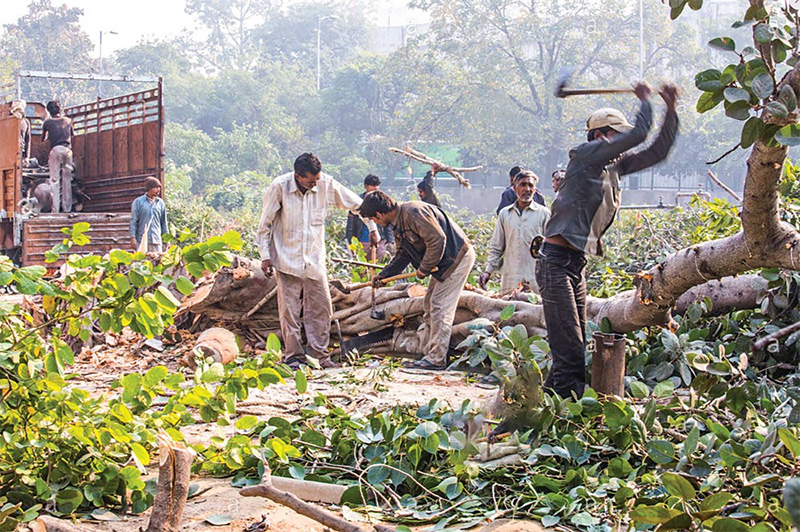
By Lynn Ockersz
The Earth was seen as ‘Good’,
And durable to last the ages,
But it’s now protesting in pain,
At the cruelties of its human Curator,
Like the blighting of all things green,
And the stealing of its treasures,
Deep inside its weary bowels,
Nor are the COP talkathons,
Moving fast to earthly revival,
Since a tight curb is yet to be placed,
On the Curator’s greed unending.
Midweek Review
North: A change in status ahead of Maaveerar Naal
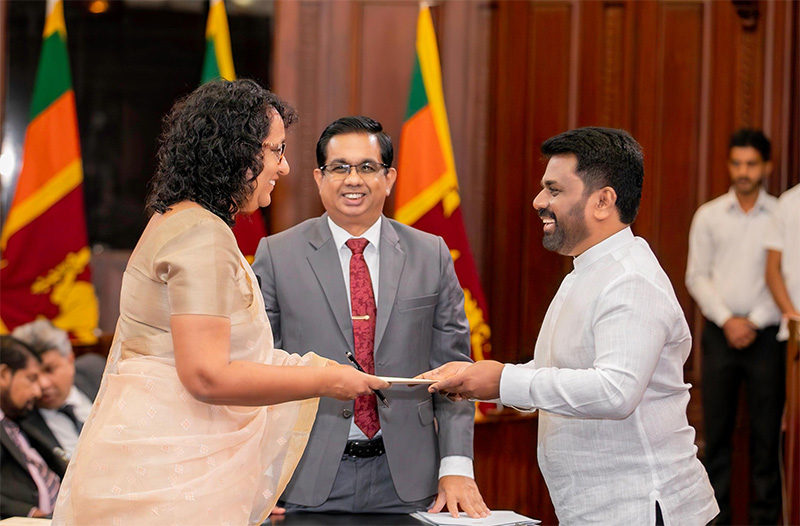
* One-time LTTE mouthpiece TNA is no more
* N & E Tamil speaking representation enhanced
* Fresh look at Sarath Fonseka’s performance at 2010 Prez poll in North required
The new government’s main challenge is ensuring the full implementation of the IMF-led post-Aragalaya economic recovery in line with the Economic Transformation Bill approved by the previous government without a vote. Whatever the side-shows, the focus not only of the government but the Parliament should be on preparing the country to resume debt repayment in 2028 or be ready to face the consequences.
By Shamindra Ferdinando
In a way it was a great thing for the country that the National People’s Power (NPP) scored an emphatic victory at the Nov. 14 general election. Now the Janatha Vimukthi Peramuna (JVP)-led NPPers can have no excuses for not being able to fulfill their promises as would have been the case if the preceding September Presidential election outcome was repeated with the combined Opposition having the lion’s share of the vote, which would have left the country with a virtual hung Parliament of no benefit to anyone other than creating a parliamentary stalemate, leading to fresh political chaos.
We will, however, grant the fact they have a very tall order to fulfill after the previous governments having virtually signed away our sovereignty with the deals they had inked during their tenures.
But we do have a nagging suspicion about someone working in not so mysterious ways against us behind the scene, after what the former US Secretary of State, John Kerry, publicly stated not too long after the defeat of President Mahinda Rajapaksa at the 2015 presidential election when he crowed to the whole world how they had spent several hundred million dollars for regime change operations at the time in several countries, including Sri Lanka. Then we also know since then how a US engineered coup ousted the popularly elected Prime Minister of Pakistan Imran Khan by way of parliamentary and military shenanigans, and then the more publicised way they ousted Prime Minister Sheikh Hasina of Bangladesh and then virtually ruined that country as was the case during the Aragalaya here in 2022 to oust the legally elected President, with a wide mandate, Gotabaya Rajapaksa.
The NPP has accomplished the impossible, even in the North, in the form of securing the Jaffna electoral district at the recently concluded parliamentary election. The NPP obtained three seats, nothing but a historic watershed.
The ruling party also won the Vanni electoral district, the scene of some of the bloodiest fighting during the Eelam War IV (Aug 2006-May 2009). Securing Jaffna and Vanni consisting of Vavuniya, Kilinochchi and Mullaitivu administrative districts, is as difficult as eradicating the conventional fighting capability of the Liberation Tigers of Tamil Eelam (LTTE). The NPP won two seats in the Vanni.
The final phase of the ground offensive was conducted in a corner of the Vanni electorate where LTTE leader Velupillai Prabhakaran met his maker.
The NPP secured two seats in Trincomalee and one in the Batticaloa districts, whereas Digamadulla gave President Anura Kumara Dissanayake’s party four more seats. Altogether 12 out of 29 parliamentary seats available in the five above-mentioned electoral districts ended up with the NPP.
The NPP delivered the stunning blow to those who still pursued separatist agenda, regardless of the LTTE’s demise over 15 years ago. The combined armed forces brought the war to a successful conclusion in May 2009.
The Illankai Tamil Arasu Kadchi (ITAK)-led Tamil National Alliance (TNA) that dominated the Northern and Eastern provinces since 2001 hadn’t been in the fray at the 2024 general election. The TNA that had been in the grip of the LTTE, during 2004-2009, disintegrated 15 years after the end of war, with the ITAK unceremoniously ending the partnership. Ex-TNA members, EPRLF, TELO and PLOTE contested the general election under the ticket of Democratic Tamil National Alliance (DTNA).
The ITAK obtained seven seats (Batticaloa three, Jaffna one, Vanni one, Digamadulla one, Trincomalee one) whereas DTNA won just one (Vanni one). It would be pertinent to mention that ITAK and DTNA fielded a common list for the Trincomalee district to ensure a split in the Tamil vote wouldn’t cost the community much valued representation therein. ITAK Trincomalee leader Kathiravelu Shanmugam Kugathasan, who replaced R. Sampanthan in Parliament at the last Parliament, won that seat.
In addition to the seven elected, the ITAK that contested under the ‘House’ symbol won one National List slot. Ahila Ilankai Tamil Congress (AITC) was the only other party to secure a seat (Jaffna/ Gajendrakumar Ponnambalam) while Independent Group 17 (Jaffna/ Ramanathan Archuna) won one. Altogether Tamil political parties obtained 11 seats, one less than the NPP.
M.A. Sumanthiran (ITAK/Jaffna), Dharmalingham Siddharthan (DTNA/Jaffna) and Sashikala Nadarajah (DTNA/Jaffna), widow of slain ITAK MP Nadarajah Raviraj were some of the big losers. In the east, one-time Chief Minister of the Eastern Province Sivanesathurai Chandrakanthan alias Pilleyan, formerly of the LTTE, failed to retain his Batticaloa district seat. Former LTTE field commander and ex-lawmaker Vinayagamoorthy Muralitharan aka Karuna Amman made an unsuccessful bid to re-enter Parliament also from the Batticaloa district.
In the previous Parliament, there had been 16 MPs representing five Tamil political parties (ITAK, AITC Eelam People’s Democratic Party [EPDP], Tamil Makkal Viduthalai Pulikal [TMVP] and Tamil Makkal Thesiya Kuttani [TMTK]. Last week’s poll eliminated EPDP, TMVP and TMTK while new entrant NPP created political history by winning 11 seats.
In spite of the humiliating setback suffered by those who had been previously in Parliament, the NPP tally has increased the total strength of the Tamil-speaking group representing N & E in Parliament. Perhaps, the successful formation of NPP’s Tamil-speaking wing may influence other political parties to re-examine their overall political strategy. They may not have any other alternative as failure to do so can further weaken their position at the forthcoming Provincial Council and Local Government polls. PC and LG polls are expected to be held next year.
Shanakiyan Rasamanickam, who re-entered Parliament with a convincing win in Batticaloa, consolidated his position, within the party and the district, due to ITAK’s admirable performance there. If not for three Batticaloa seats, ITAK aka Federal Party would have been in an utterly embarrassing position. Batticaloa electoral district is the only one that the NPP couldn’t win. Therefore, the outspoken Rasamanickam can be really happy to have thwarted the NPP in the eastern district.
Now to bury the hatchet between the two or, more correctly, the three literally warring communities here, NPP will have to think out of the box to find a solution that may be by way of sharing power at the centre rather than the periphery, as was successfully done under the Donoughmore Constitution.
Accountability issues
At the presidential election held in Sept. the NPP couldn’t win at least one electorate in the North but did so well several weeks later, it could win Jaffna and Vanni electorates. If not for that sterling performance, the NPP couldn’t have secured an unprecedented 2/3 majority. President AKD should be ever grateful to the northern and eastern electorates for facilitating a 2/3 majority.
Since the introduction of the proportional representation at the 1989 Parliamentary election, no party succeeded in securing a 2/3 though many alleged the Rajapaksas abused such huge mandates. They were, of course, referring to the UPFA securing 144 seats and 145 seats at the 2010 and 2020 general elections, respectively. For a simple majority, the winning party needs 113 seats while 2/3 means 150 seats.
Against the backdrop of NPP’s victory in the N & E, the new Parliament should review Sri Lanka’s response to post-war accountability issues. Since the eradication of the LTTE, the TNA propagated politically motivated unsubstantiated war crimes allegations, both here and abroad. Finally, the treacherous Yahapalana government (2015-2019) betrayed the war-winning armed forces at the Geneva-based United Nations Human Rights Council (UNHRC) in Oct 2015. The accountability resolution that had been co-sponsored by the US-led grouping and Sri Lanka was meant to pave the way for a new Constitution aimed at doing away with the country’s unitary status.
Interestingly, the war-winning Army Commander, Sarath Fonseka, who had been promoted to the rank of Field Marshal, in March 2015, served in that Yahapalana Cabinet, chaired by President Maithripala Sirisena. The role played by the then Premier Ranil Wickremesinghe and the late Foreign Minister Mangala Samaraweera in that despicable act is in the public domain. The failure on the part of Fonseka, who served President Sirisena’s Cabinet to vigorously oppose the government move is still a mystery.
The writer repeatedly discussed the failure on the part of Parliament and urged concerned political parties to raise the Yahapalana-TNA Geneva operation after the same lot fielded Fonseka as the common presidential candidate in 2010. Although Fonseka lost the contest by a massive 1.8 mn votes to war-winning President Mahinda Rajapaksa, he handsomely won the Jaffna, Vanni, Trincomalee, Batticaloa and Digamadulla electoral districts at the same election.
The NPP’s excellent showing in the N & E at the recently concluded general election should be examined taking Fonseka winning the former war zones 14 years ago.
Having alleged Fonseka’s Army of war crimes throughout the northern campaign, the TNA had no qualms in backing the Sinha Regiment veteran. Unfortunately, political parties represented in Parliament never bothered to raise TNA’s duplicity. Instead, all of them shamelessly and brazenly played politics with the issue, seeking petty political advantage at the expense of the armed forces. There hadn’t been a single instance of a war-winning country betraying its armed forces hitherto anywhere in the world. It was only the Maithripala Sirisena/Ranil Wickremesinghe govt. that achieved that dastardly act.
The JVP, though being not part of the Yahapalana Cabinet, never opposed the government’s move against the armed forces. However, the NPP’s victory in the North, perhaps would give an opportunity for President AKD, who is also the Defence Minister and Commander-in-Chief of the armed forces, to address the issue at hand afresh. President AKD retained the Defence portfolio when the new Cabinet of Ministers was sworn in last Monday.
The developing situation in the North may help post-war national reconciliation efforts. Successive governments deliberately allowed further deterioration of relations between the two communities by not taking apt remedial measures. Those who propagated lies were allowed to do so much to the disappointment of the armed forces. Parliament turned a blind eye even when the US and Australia et al denied visas to retired and serving officers and US imposed travel ban on the then Army Commander Gen. Shavendra Silva, the incumbent Chief of Defence Staff (CDS). Maj. General Chagie Gallage, now retired, is another victim of external reprisals.
Maaveerar Naal (Great Heroes’ day)
The Tamil Diaspora must have been quite surprised by the outcome of the general election. Some interested parties played down the importance of NPP victory in the North on the basis of low turnout of voters. It would be interesting to observe how the Diaspora and political parties here mark this year’s Maaveerar Naal. Commencing 1991, the LTTE used to celebrate Nov. 21-27 week as Great Heroes Week. During the period the group wielded power, the weeklong celebrations and activities received even international media attention.
This year, Maaveerar week is scheduled to commence on Nov 21 (tomorrow), the day the 10th Parliament meets. What would those elected from the NPP, ITAK and other parties do this year? Would interested parties seek to cause some unnecessary commotion in a bid to embarrass the government. Let us hope the government would handle the situation cautiously as opportunistic elements on both sides seek to exploit the developments. ITAK’s Sivagnanam Shritharan paid tribute to fallen Maaveerar at Kanagapuram, Kilinochchi.
The NPP’s unexpected victory in the north may compel not only Tamil Diaspora but Western countries, particularly Canada, to review their position.
Canada declared May 18 as Tamil Genocide Remembrance Day as Premier Justin Trudeau’s government sought to appease Canadian voters of Sri Lankan origin. Canada cannot under any circumstances ignore the Tamil vote received by the NPP as people discarded unsubstantiated war crimes allegations directed at the government, for the second time. Had the northern electorate believed the Army wantonly killed civilians on the Vanni east front in 2009, as alleged by the UN, they wouldn’t have voted for Fonseka. Perhaps, the people wanted the government to bring the war to an end at any cost. Having waged two terror campaigns in 1971 and 1987-1990, the JVP should be able to comprehend the need and the responsibility on the part of the government of the day to take whatever measures necessary to deal with the challenge.
The NPP was formed in 2019 just months ahead of the presidential election as the JVP realized it couldn’t push ahead on its own but needed wider public support. The NPP achieved that with ease within six years.
In August 2006, the then President Mahinda Rajapaksa went ahead with an-all-out campaign against the LTTE after failing to convince them to negotiate for a final settlement. President Rajapaksa had no option but to go on the offensive after the failed LTTE assassination attempts on the then Army Commander Lt. Gen. Fonseka (April 2006) and then Defence Secretary Gotabaya Rajapaksa (Oct. 2006). The TNA remained committed to the LTTE’s murderous cause until the very end.
A matter for serious concern
An unbelievably large number of voters skipped the general election. All political parties, including the NPP, should be concerned over the unprecedented deterioration of voter interest, especially after a thrilling presidential election brought AKD to power just six weeks ago. A substantial increase for the NPP from 5,634,915 votes (42.31 %) at the presidential to 6,863,186 (61.56%) at the general election just weeks later shouldn’t be allowed to divert attention to the massive drop in public interest. Well over half a million rejected votes, too, must worry all.
The NPP won 159 seats, including 18 National List slots, nine more than required for a 2/3 majority. At the presidential election 3,520,438 voters refrained from exercising their franchise. But that figure increased to 5,325,108 at the general election while the number of rejected votes, too, recorded a significant increase. According to the Election Commission, at the presidential poll, the number of rejected votes was 300,300 while the general election recorded 667,240 rejected votes.
What really caused such an increase in the number of rejected votes was when the number of polled votes dropped from 13,619,916 votes (79.46%) to 11,815,246 (68.93%)? In other words of the 17,140,354 people eligible to vote, a staggering percentage decided not to. Voter apathy is not healthy. Not healthy at all.
A rethinking on the part of the SJB and New Democratic Front (NDF/consisted of former SLPP lawmakers and UNP) is necessary as they couldn’t at least retain the number of votes received at the presidential election. SJB that polled 4,363,035 votes (32.76 %) at the presidential poll could muster only 1,968,716 (17.66%) at the general election, while NDF could secure 500,835 (4.49%) having polled 2,299,767 (17.27%) just weeks ago. The SJB and NDF ended up with 40 seats (including five NL slots) and five seats (including 2two NL slots) while the SLPP that won 145 seats at the 2020 general election had to be satisfied with three seats, including one NL slot.
Both Sajith Premadasa and Ranil Wickremesinghe should seek remedial measures before the EC announced PC and LG polls. Perhaps, divided groups have to unite under one banner either under SJB or UNP or face annihilation at the PC and LG polls. For Premadasa and Wickremesinghe time seemed to have run out.
The SLPP obtained 350,429 votes (3.14%) at the general election up from 342,781 (2.57 %) at the presidential election. For the SLPP a rapid recovery process will never be possible as its only NL member and leader of the minute group Namal Rajapaksa is likely to be the target of corruption investigations. The SLPP group consists of Namal Rajapaksa, newcomer Chanaka Sampath (Galle) and D.V. Chanaka (Hambantota).
Fifteen political parties represented the last Parliament. They were SLPP (145), SJB (54), ITAK (10), NPP (03), EPDP (02), AITC (02), TMVP (01), SLFP (01), MNA (01), TMTK (01) TMTK, ACMC (01), NC (01), SLMC (01), UNP (01) and OPPP (01). The new Parliament will be represented by 13 political parties and one independent group – namely NPP 159, SJB 40, ITAK 08, NDF 05, SLPP 03, SLMC 03, Sarvajana Balaya (NL), UNP (01), DTNA (01), ACTC (01), ACMC (01), Jaffna Ind. Group 157 (01) and SLLP (01).
-
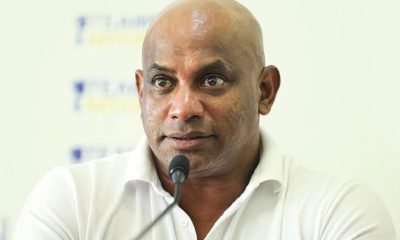
 Sports7 days ago
Sports7 days agoPathum will become world’s best batter, says Jayasuriya
-
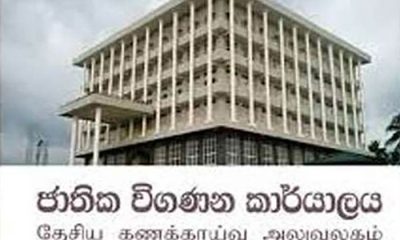
 News6 days ago
News6 days agoAbout 1,000 permits issued to SL migrant workers for electric vehicle imports misused
-
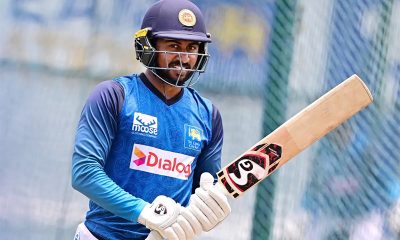
 Sports2 days ago
Sports2 days agoA lot at stake in Sri Lanka – South Africa Tests
-
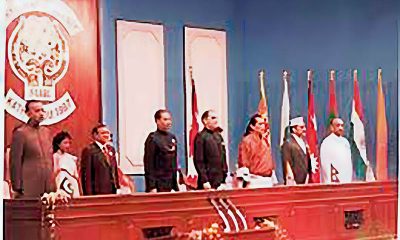
 Features5 days ago
Features5 days agoKathmandu 1987 and Islamabad 1988
-
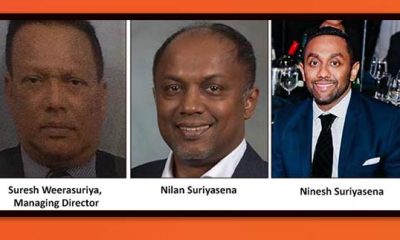
 News7 days ago
News7 days agoGoldi Sands celebrates its 50th anniversary
-

 Business7 days ago
Business7 days agoDialog’s WOW Superapp Redefines Digital Lifestyle with Advanced User Experience
-

 Editorial7 days ago
Editorial7 days agoSign of capitulation
-
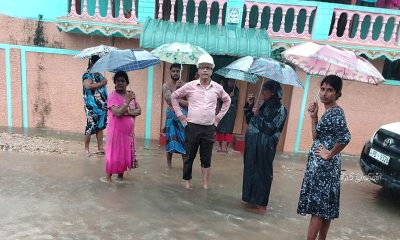
 News6 days ago
News6 days agoTorrential rains play havoc in Jaffna


